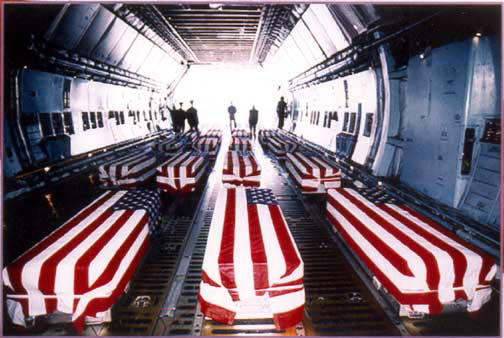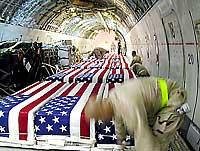
SOME REFLECTIONS ON VETERANS DAY, 2006
Nick Gier, Professor Emeritus, University of Idaho

Coffins coming home from Iraq found at www.thememoryhole.org/war/coffin_photos/military_coffins3.jpg
At 11 AM on November 11, 1918, the guns fell silent on the battlefields of Europe. Four million soldiers died, 6 million civilians were killed, and 21 million were wounded. It was said that this was "the war to end all wars," and people around the world were inspired by U. S. President Woodrow Wilson's "Fourteen Points," the fifth of which recognized the right of self determination of all people, including those under colonial rule.
The Treaty of Versailles, however, ignored Wilson's idealism and imposed humiliating conditions on Germany, which led to economic and political chaos and the rise of Hitler. The people of the Middle East were promised self-determination, but Britain and France broke a promise they made to Lawrence of Arabia and carved out their own spheres of domination.
France kept its colonies in Southeast Asia, inspiring the rise of the Vietnamese Communist Party and two disastrous wars. Britain also held on tight to India, the jewel in former Empress Victoria's crown, preventing the possibility of a united South Asia, where Hindus and Muslims could have lived in peace rather than fighting four wars between a Hindu India and a Muslim Pakistan.
After 28 states had voted to celebrate their own Veterans Day, Congress, in a joint resolution on June 4, 1926, voted to set aside November 11 as a day to honor those who fought in "the most destructive . . . and far reaching war in human annals." Members of Congress also recognized the "resumption . . . of peaceful relations with other nations, which we hope may never again be severed." They further encouraged all Americans to build "peace through good will and mutual understanding between nations."
After a name change from Armistice Day in 1954, Veterans Day is not only a time to remember those who have served, but it is also an opportunity for us to think about how we can bring about world peace. We should redouble our efforts to make sure that our military men and women never again have to make the ultimate sacrifice. No president should send these good people to war unless we are directly attacked; or unless, in situations of no immediate threat, the issues are thoroughly debated and a consensus to intervene militarily is reached with as many major powers as possible.
We should support our troops no matter where they are sent, but there is no honor in having them fight battles that do not follow just war principles or violate international law. The Internet Encyclopedia of Philosophy defines a legitimate war as "having just cause, being declared by a proper authority, possessing right intention, having a reasonable chance of success, and the end being proportional to the means used." Nations that go to war are also responsible under international law to protect the lives of noncombatants, use humane interrogation techniques, and provide shelter, clothing, food, and medical care for prisoners.
It is significant to note that until now the U. S. has always recognized waterboarding, a torture technique that goes back to the Inquisition, as a war crime. In 1901 Major Edwin Glenn got 10 years in prison for acts of simulated drowning on a Philippine insurgent. In 1968 an army officer was court-martialed for a waterboarding incident in Vietnam. The detainee bill passed by the 109th Congress allows the CIA to continue using waterboarding as an "alternative" interrogation technique, while the revised Code of Military Conduct outlaws it. The military is choosing to act more honorably than our civilian leadership.
We have always thought that civilian control of the military is a good policy. But what if the rash and unprincipled actions that we once feared the military might do are done by civilian leaders instead? Former Secretary of Defense Rumsfeld overruled generals who proposed that at least 300,000 troops were necessary to secure Iraq; he scrapped a State Department plan for reconstruction; he made light of the fact that military vehicles were not properly armored; and his President ignored the Geneva Convention on Torture. These arrogant actions have caused unnecessary Iraqi and American deaths and have ruined our nation's reputation.
Some claim that the terrorist threat is so different that we can no longer follow the principles of a just war or conform to international law. In my own way I agree with the first point but of course disagree with the second. At a recent symposium at the University of Idaho, former Senator Gary Hart correctly described international terrorists as criminal syndicates, and he said that we must deal with them in the same way that we deal with other criminals. Hart agrees with the Europeans, who have refused to call our new struggle a "war," and have chosen instead to intensify their very effective police efforts to track down and arrest terror suspects.
Even the most heinous criminals are given basic rights, including a right to appear before a judge and hear the charges against them, a right that Congress now denies terror suspects, many of whom were arrested because their neighbors got $1,000 for turning them in. Furthermore, even our worst criminals are not forced to confess by being tortured.
Our armed services contain some of the best trained and equipped men and women in the world. I'm confident they could successfully defend American against any conventional attack, and I would drop everything and help them in any way possible. But sending our troops to the Middle East has created more terrorists than ever before. Remember that Osama bin Laden, previously a recipient of U. S. aid in Afghanistan, turned against us after we stationed troops in Saudi Arabia, his home country.
 Since 2003, over 2,800 flag-draped coffins
have arrived at Dover Air Force Base without any public
recognition. The Seattle
Times published a photo of the inside of a plane loaded with 20 coffins as
it prepared to depart from Kuwait. The photographer, Tami Silico, was
fired from her job as a civilian contractor for violating a Pentagon policy that
has been in place since 1991. In
previous wars the press respectfully took pictures of the returning dead, so
this policy is yet another means to shield the American public from the
unnecessary sacrifices in this disastrous war. In the Vietnam War 58, 198
soldiers died for nothing, and now these brave men and women have
also died in vain.
Since 2003, over 2,800 flag-draped coffins
have arrived at Dover Air Force Base without any public
recognition. The Seattle
Times published a photo of the inside of a plane loaded with 20 coffins as
it prepared to depart from Kuwait. The photographer, Tami Silico, was
fired from her job as a civilian contractor for violating a Pentagon policy that
has been in place since 1991. In
previous wars the press respectfully took pictures of the returning dead, so
this policy is yet another means to shield the American public from the
unnecessary sacrifices in this disastrous war. In the Vietnam War 58, 198
soldiers died for nothing, and now these brave men and women have
also died in vain.
Note: If the photo does not execute, try www.class.uidaho.edu/ngier/vet.htm.